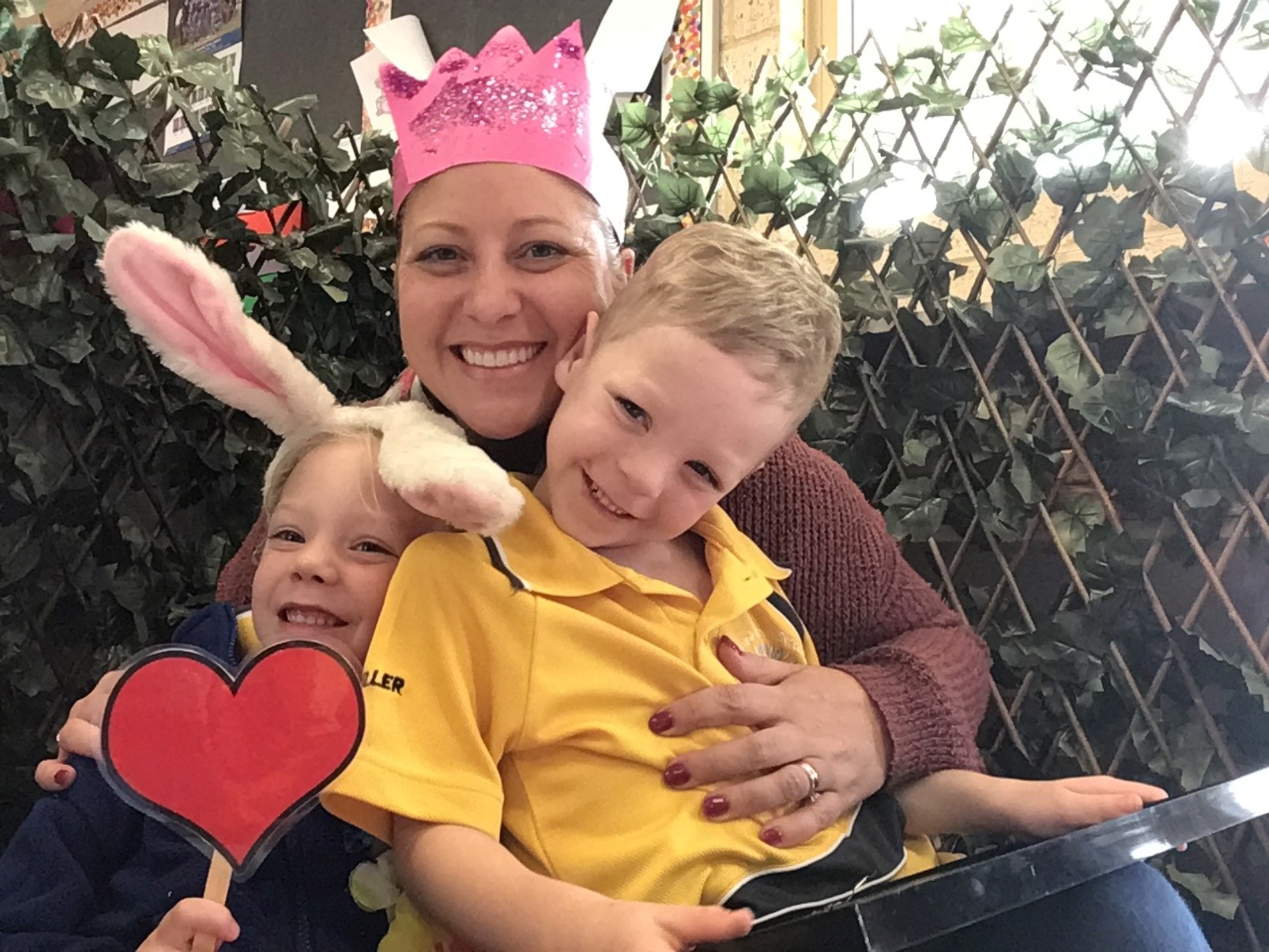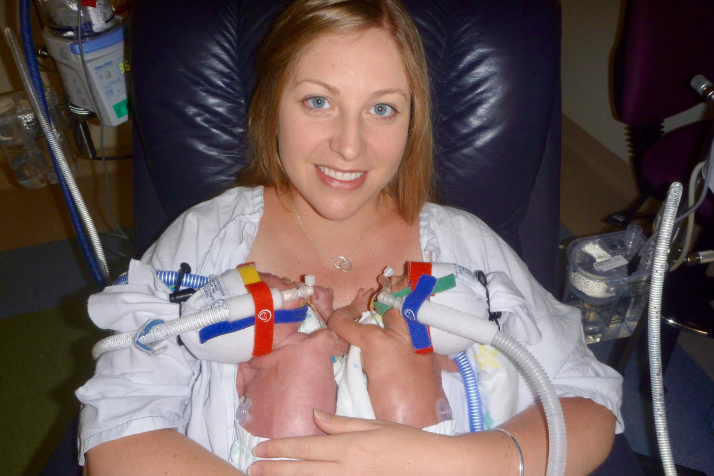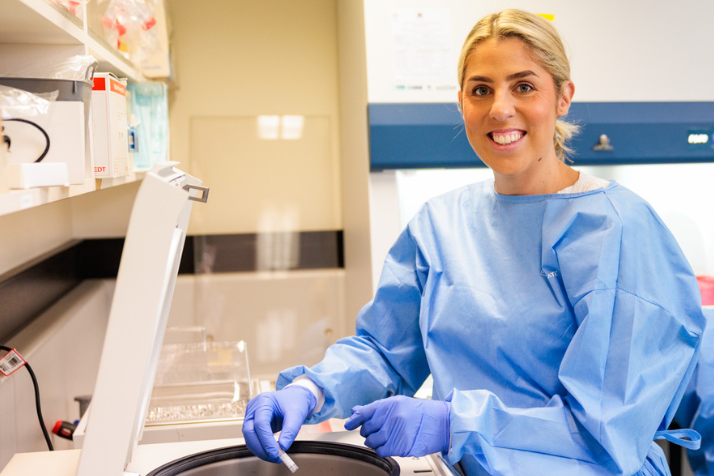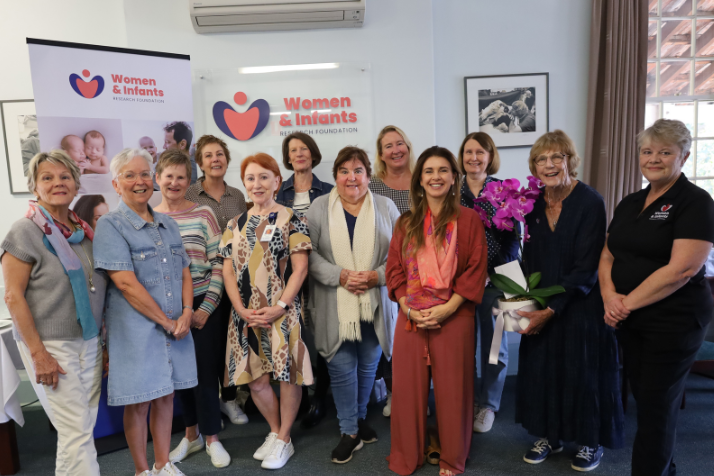Katrina’s pregnancy with her twins, Olivia and Kyle, was progressing smoothly. Her 20-week scan showed everything was on track, and her next appointment also brought reassuring news. However, at just 23 weeks and three days, Katrina felt something was wrong.
“I knew in my gut that something wasn’t right,” Katrina said. “And I was right – one of my membranes had ruptured.”
She was immediately given a steroid injection and transferred to King Edward Memorial Hospital (KEMH), where she underwent extensive testing and monitoring for infection. Another round of steroids followed, and doctors delivered sobering news – she wouldn’t be leaving the hospital until her babies were born.
At just under 24 weeks, the border of viability, Katrina and her husband had a heartbreaking conversation with the medical team about what might happen if the babies arrived too soon. The odds were daunting – just a 50-50 chance of survival.
“That was the hardest discussion we’ve ever had,” said Katrina. “They walked us through the possible consequences, the disabilities, and what our family life might look like.”
Katrina remained in the hospital until the critical moment arrived – Olivia was born at 10.33pm, followed by Kyle at 10.53pm, at just 24 weeks and one day gestation, weighing only 600 grams each, in December 2017.
“It was traumatic,” said Katrina. “Each baby had their own team working on them. I didn’t even get to see Olivia before she was taken away. I only got a tiny glimpse of Kyle.”
Later that night, at around 2am, Katrina and her husband Dave made their first visit to the NICU. Olivia and Kyle would spend the next 89 days between the NICU and the special care nursery.
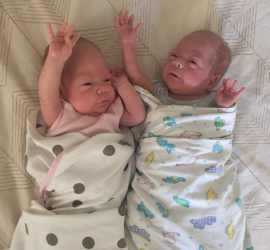
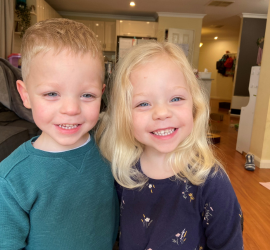
The challenges of prematurity
For Katrina, those first few months were a rollercoaster of emotions.
“I just wanted them to live. That’s all I focused on every day.”
Holding her babies was a heartbreaking milestone – she wasn’t allowed to hold them for over a week. Olivia was first at seven days, Kyle at eight. Their eyes remained shut for days, and naming them felt impossible until she could see their eyes.
Throughout their NICU stay, Olivia and Kyle endured numerous medical challenges, including multiple blood transfusions, PDA (a heart valve condition), and other prematurity-related complications.
Kyle struggled more – he had a brain bleed and needed medication to close his heart valve.
They were too fragile to be next to each other at first and didn’t meet for six weeks.
“When they were finally placed together, it was such a relief,” Katrina said.
Despite the odds, both babies progressed well, defying expectations. They came home earlier than expected at 36 weeks and five days.
The journey continues
Even after discharge, their journey was far from over. Olivia and Kyle underwent years of medical monitoring and therapy.
“KEMH followed them for five years because they were micropreemies,” Katrina said. “The first two years were filled with physio, specialist appointments, and weekly checkups.”
There were early concerns about Olivia potentially having cerebral palsy, but she does not. Kyle had frequent bouts of croup, requiring hospitalisation multiple times. Both had retinopathy of prematurity (ROP), necessitating weekly follow-ups at the Perth Children’s Hospital.
By two and a half years old, both Olivia and Kyle were doing well, and in March 2023, they were officially ‘signed off’ from further checkups.
“Having them constantly assessed for issues was exhausting. I felt like medical professionals kept looking for things wrong with them, so they could do early intervention, but I knew they were fine. I had to keep defending them,” Katrina said.
“When they were finally given the all-clear, it was the first time in over five years that I felt like I could breathe again.”
Today, Olivia and Kyle are in Year 2 and are happy, active, and bright children.
“They love playing video games, being outside, and are adored by their teachers,” Katrina shares. “They’re similar but different in their own ways.”
While Olivia and Kyle have thrived and have no lasting medical complications, the experience left a lasting impact on Katrina.
“I have experienced symptoms of PTSD,” Katrina said. “I’ve had a lot of counselling. In the early days, I couldn’t let anyone else look after Olivia and Kyle. I wouldn’t let them out of my sight. Even when they started school, I just wanted them to be close.”
Now, she has learned to let go and trust others to care for her children.
Having walked this journey, Katrina shares advice for parents going through similar experiences:
- Ask as many questions as you can. “Knowledge is power.”
- Trust your gut. “If something doesn’t feel right, speak up and demand to be heard.”
- Build a community. “Other NICU parents going through a similar experience were my lifeline.”
She remains deeply connected to the NICU community through groups like Helping Little Hands and Tiny Sparks and regularly meets up with other NICU families.
The importance of research
Katrina is grateful for the medical advancements that helped save her babies.
“Anything that can improve outcomes for premature babies is amazing,” she said.
“The research and progress in neonatal care made a world of difference. I was told that they’d never seen an outcome this good for babies this small – and I truly believe things like kangaroo care, skin-to-skin contact, and reading to them helped with their progress.”
While Katrina’s family’s story has a happy ending, many premature babies face significant challenges. Each year, approximately 13.4 million babies are born prematurely worldwide, with nearly 8% of Australian babies arriving before 37 weeks. Those born extremely preterm, like Olivia and Kyle, are at higher risk for complications, but medical advancements continue to improve survival rates and long-term outcomes.
WIRF remains committed to researching and developing better care for premature babies, ensuring every newborn has the best possible start in life.
Katrina’s journey is a testament to the strength of NICU families, the power of medical research, and the resilience of tiny fighters like Olivia and Kyle.
